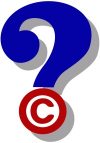
Dear Doc:
I know that in the past you have said (complained, actually) that copyrights last far too long…for the life of the author plus another 75 years (or 95 years for corporate-authored works.) That said, it was not always the case that the term was so extensive. How can I know if a book or other work is still protected by copyright, or if it’s fallen into the “public domain”.
Signed,
Anxiously Copying
Dear AC:
Wow, are you in luck! Until very recently, it was just about impossible to determine the copyright status of most older works. Ones from before about 1923 were definitely no longer protected by copyright. Newer ones were troublesome. The problem was so pervasive that it had a name: orphan works. You couldn’t figure out who owned the copyrights in millions of books and other works, or even if the copyright was still in force. So, for most of these works, it was not worth the time and effort required to track down the information, meaning that most potential users of the works just left them alone, because they were worried about getting sued by the copyright owner coming out of the woodwork.
Before 1964, books had a 28-year copyright term. Extending it for an additional 28 years required authors and publishers to send in a separate form and payment to the Copyright Office, and lots of people didn’t bother to do that. After 28 years, their copyrights ended and the books became part of the public domain, free for anyone to use and copy.
Through the 1970s, the Library of Congress published a “Catalog of Copyright Entries”, listing all the registration and renewals filed. These lists have long been on-line, but converting the information in the lists into useful legal information about what books fell into the public domain was a difficult and tedious task. The New York Public Library has finally done just that, and now it’s possible to know which books are available for free! It turns out that around 80% of all the books published in the United States from 1923 to 1964 are in the public domain.
The Hathi Trust, a digital library similar to Project Gutenberg, has uploaded some of the newly free books. Leonard Richardson, a blogger from Los Angeles, has created a “bot” called Secretly Public Domain which posts a newly discovered book from the Library’s every day. Guttenberg and HathiTrust aren’t the only places to get free ebooks. Many libraries offer digital and audio books, for free, as well. Reading a classic or a new release can be a simple as getting a library card and downloading an app. Another source for public domain titles is Standard Ebooks.
While all of this does not address the problem of overly-long copyright terms and “gift” renewals and extensions of copyright (like the Sonny Bono Copyright Term Extension Act, a.k.a., the “Mickey Mouse Act”), at least we know which older works are actually part of the public’s right to use works that form the basis of the grant of copyright in the first place: that we protect works for a “limited term” in order to promote creativity. That’s not chopped liver!
Have an intellectual property question that’s searing through your every waking thought? As the attorneys at LW&H. They just live for such things.
Until next month,
The “Doc”
— Lawrence A. Husick, Esq.

